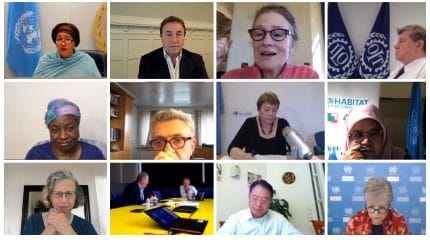UN leaders pledge to step up sustainable development initiatives to save lives, protect economies and help countries recover better from COVID-19
The United Nations Sustainable Development Group (UNSDG) met virtually today to coordinate support so countries can overcome and recover better from the COVID-19 pandemic. The group members, the chiefs of 41 UN entities working on development, also reviewed progress in reinforcing humanitarian-development collaboration and consolidating the reforms launched by Secretary-General António Guterres to strengthen the UN’s support to the 2030 Agenda for Sustainable Development.
UN Deputy Secretary-General Amina J. Mohammed and UNSDG chair underscored that the COVID-19 pandemic is a global health, humanitarian and socioeconomic emergency.
“Behind the numbers are people and families. COVID-19 placed many things on pause, and also exacerbated grave existing problems including inequality and climate change. The way the UN system responds now will put our reforms in action to enable us to better address this development crisis in full emergency mode,” she said.
UN Principals shared deep concerns regarding the multiple and far reaching impact of the COVID-19 pandemic. If not addressed with determination, the crisis will increase poverty and inequalities at a global scale, eroding hard won sustainable development gains—with only 10 years left to achieve the Sustainable Development Goals (SDGs) by 2030. Only immediate and effective socio-economic responses and international solidarity will ease global suffering, saving lives and livelihoods, and protect the health of people and planet for years to come.
The UNSDG members discussed efforts to put in practice the “United Nations Framework for the immediate socio-economic response to COVID-19: Shared responsibility, global solidarity and urgent action for people in need”. The framework calls for protecting jobs, businesses and livelihoods to set in motion a better recovery of societies and economies as soon as possible for a more sustainable, gender-equal, and carbon-neutral path— better than the “old normal”.
Leveraging the reforms already made to transform the UN development system, all Principals committed to making the most of UN assets at the global, regional and local level to target the most vulnerable countries, groups and people who risk being left behind. This is complemented by the new COVID-19 Response and Recovery Fund, launched in early April to catalyze joint actions by UN Country Teams.
UN teams covering 162 countries and territories will rollout this recovery plan in the next 12 to 18 months, under the leadership of UN Resident Coordinators (RCs), supported by a network of global and regional expertise. Resident Coordinators are already working hand-in-hand with the World Health Organization (WHO) to help countries suppress the transmission of the COVID-19 virus. As the technical lead in the socio-economic recovery efforts, the UN Development Programme (UNDP) will also support RCs, with UN teams working as one across all aspects of the response. To ensure strong policy support to countries, RCs are working closely with the Department of Social and Economic Affairs (DESA), Regional Economic Commissions and other specialized agencies in implementing the Framework at the country level.
Amidst the COVID-19 pandemic, protracted humanitarian crises caused by conflict, resource scarcity and natural disasters are continuing – and will almost certainly worsen as reported by the Joint Steering Committee to Advance Humanitarian and Development Collaboration. With this in mind, the UNSDG has also reviewed progress in strengthening humanitarian development collaboration, with a priority focus on countries with high levels of vulnerability and where humanitarian, peacebuilding and development challenges coexist.
New York, 13 May 2020

